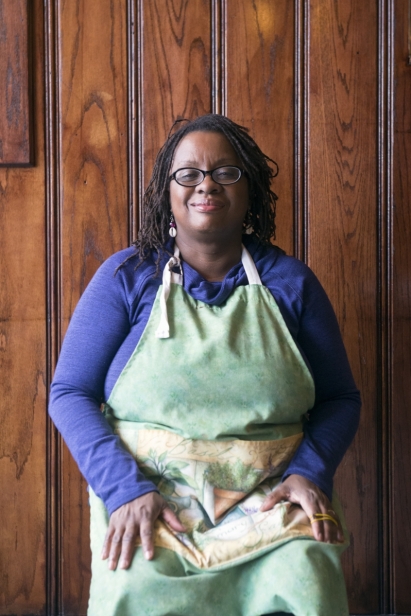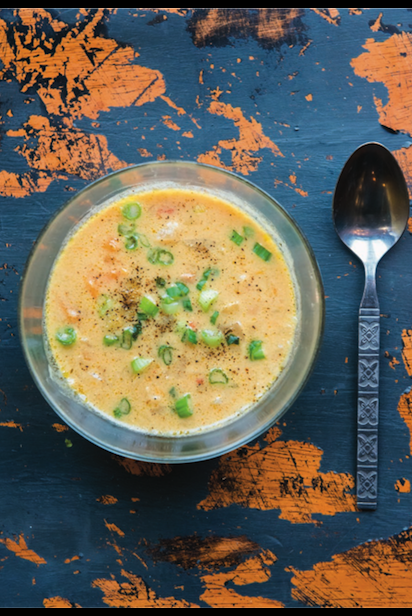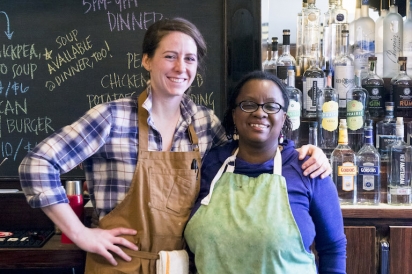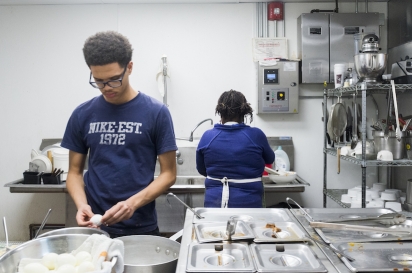Mama's Kitchen
In some ways, I had been preparing for these days for the larger portion of my adult life. I just did not fully understand it all until my 98-year-old grandmother, Ora, finally arrived at our home for a two-week visit.
From the first moment she stepped into my kitchen, she was transported back to another time.
“Mama’s kitchen?” It was not a confusion attributed to her dementia, which could be so overwhelming at times. It was a question that arose out of seeing the wooden table, the herbs hanging, the pots on the stove, jars filled with rice, beans, spices, and dried herbs, the tea kettle steaming, the bowls of potatoes and onions.
It was the sentiments — and aromas — in the air, that invited grandma back to her younger years. The kitchen that my grandmother grew up in, that magical space that was cultivated by her mother, Nellie, was, indeed, a huge inspiration for my own kitchen.
I cannot remember a time when I stepped into Great Grandma Nellie’s kitchen and a pot of beans was not simmering; women were not chattering; or fresh greens, herbs, carrots or potatoes were not being chopped at her wooden kitchen table.
To have my grandmother walk into my kitchen — and be a bit puzzled by whether or not she was in her own mother’s kitchen — brought me to heartwarming tears of joy.
“No,” she went on to say with certainty, “Mama is dead. This is not Mama’s kitchen.” She was not talking to me, but was continuing to put it all together.
“Mama would love this kitchen. I love this kitchen,” she said.As she stayed with us those two weeks, the kitchen was where she wanted to be; chopping vegetables, singing old hymns and re-telling family stories.
I was raised in a multitude of kitchens throughout the hills of Pittsburgh, Pa. The kitchens of both my maternal and paternal grandmothers were enchanted places for me. They were where my love of cooking was nurtured, and eventually, blossomed.
However, the kitchens I found myself exploring alongside my father, a chef and caterer who would be called upon to prepare culinary delights for one hundred to one thousand or more folks, those kitchens also were places where the groundwork for my present life of cultivating relationships through food was birthed.
Whether he was dicing and simmering for the wealthy Carnegies, or slicing and roasting for a neighbor’s birthday celebration, my father modeled for me howimportant it is to put all of the compassion and other goodness that stirs in your own being into the dishes you brew for others.
He taught me that you feed a community well by first foraging for the love for humanity that lies deep within your own soul. Preparing good food is not a job. It is a calling.
On my present life journey, it is an agricultural, spiritual, culinary vocation that often begins with soil, supplication and seed, tended on an urban farm and culminates with a multitude of renewing feasts, shared by many, served up in kitchens throughout the city.
The rhythm of kitchens throughout Milwaukee, and the nourishing cuisine that is created within them, have the power to keep me spellbound, just like those in the old steel town that sprouted my devotion to food.
Whether I am cooking at The Tandem, popping in to see who is stirring the pots on the stove at Irie Zulu, hanging out in the lovely home kitchen of Martha Davis Kipcak, sitting at the Chef’s Counter at Braise on date night, sharing a meeting and a meal in the Walnut Way kitchen, or visiting the Wrights for tea and a sandwich in their cozy Tudor kitchen, Milwaukee’s kitchens have sustained me, my imaginings, my hopes.
They have kept alive my strong belief that meals prepared and shared from the depths of both our beings and our kitchens have the power to slow us down and restore us.
The tenderness to heal.
The Saturday morning my grandmother was to leave, I awakened early, sat at my kitchen table and cried like a baby. There was a passing of the “family torch” that I knew had already occurred, four years prior during a visit I made to Pittsburgh.
“You are not the oldest,” my grandmother said, “But you have the strongest memories. A lot is going to rest with you.”
My grandmother’s journey to Milwaukee — and to my kitchen table — made it all so clear. Some of the most important things we pass on to our children and grandchildren happen in the kitchen, come from the land, involve pots and pans, were sung by our ancestors and may be found in table blessings at our kitchen tables.
My grandmother’s visit guided me in understanding that there is a continuum of values, faith and well-being that should flow in our families from generation togeneration. This continuity is most often found in the prayers we offer, the recipes we pass along, the food we grow, the refrains we hum, the stories we retell, the tables we set and —in my family — the kitchens we create.







